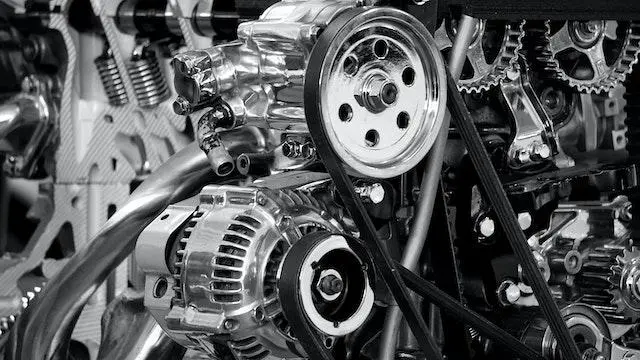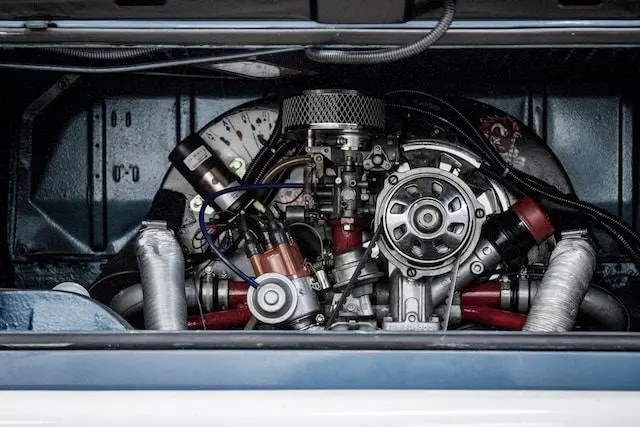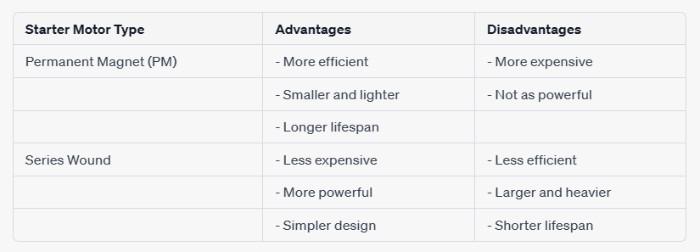What is a Car Starter Motor, and how does it work?
Published Date: 10th Jul 2023
 A car starter motor, commonly known as the car's ignition system, is a small but vital electric motor responsible for initiating the engine's ignition sequence. Located within the engine bay, the starter motor is intricately linked to the flywheel, facilitating the seamless transmission of rotational motion with utmost efficiency. Turning the key in the ignition causes the starter motor to engage with the flywheel, thereby initiating the mechanical process of cranking the engine until it comes to life and starts running smoothly. Understanding this crucial component's role helps us appreciate its significance in the intricate workings of a car's engine.
A car starter motor, commonly known as the car's ignition system, is a small but vital electric motor responsible for initiating the engine's ignition sequence. Located within the engine bay, the starter motor is intricately linked to the flywheel, facilitating the seamless transmission of rotational motion with utmost efficiency. Turning the key in the ignition causes the starter motor to engage with the flywheel, thereby initiating the mechanical process of cranking the engine until it comes to life and starts running smoothly. Understanding this crucial component's role helps us appreciate its significance in the intricate workings of a car's engine.
The starter motor is a relatively simple device, but it is essential for starting your car. If the starter motor fails, you cannot start your vehicle and will need to have it towed to a Vehicle technician or mechanic.
Here are some of the key components of a car starter motor:
- Armature: The armature is the rotating part of the starter motor. It is made up of a series of coils of wire that are wound around a core.
- Field coils: The field coils are located around the armature. They create a magnetic field that interacts with the armature to produce torque.
- Solenoid: The solenoid is a switch that engages the starter motor. When you turn the key in the ignition, the solenoid closes and connects the starter motor to the battery.
- Gear train: The gear train is a series of gears that multiplies the torque the starter motor produces. This allows the starter motor to turn the flywheel even though it is much smaller than the flywheel.
The starter motor is a vital part of your car, and keeping it in good working order is important. If your starter motor is failing, it is best to have it checked by a motor technician or mechanic as soon as possible.
Different Types of Starter Motors
Mainstream cars usually utilize two primary types of starter motors, Permanent magnet (PM) starter motors and series-wound starter motors.
 Permanent Magnet: PM starter motors are the most common starter motor type. They use permanent magnets to create the magnetic field that interacts with the armature. PM starter motors are more efficient than series-wound starter motors but are also more expensive.
Permanent Magnet: PM starter motors are the most common starter motor type. They use permanent magnets to create the magnetic field that interacts with the armature. PM starter motors are more efficient than series-wound starter motors but are also more expensive.- Series Wound: Series-wound starter motors use a series-wound field coil to create the magnetic field. Series-wound starter motors are less expensive than PM starter motors and less efficient.
In addition to these two mainstream types, there are a few other types of starter motors, including:
- Direct-drive starter motors: These starter motors do not have a gear train. Instead, the armature is directly connected to the flywheel. Direct-drive starter motors are more efficient than starter motors with a gear train but are also more expensive.
- Remote starter motors: These starter motors are located outside the engine bay. They are used in cars with diesel engines, which require more power to start than petrol engines.
- High-torque starter motors: These motors are designed to start engines with high compression ratios. They are often used in diesel engines and large trucks.
The starter motor type used in a car depends on the size and type of engine. Smaller engines typically use PM starter motors, while larger ones use series-wound starter motors.
Which type of Starter Motor are better?
As you can see from the table below, PM starter motors are more efficient and have a longer lifespan than series-wound starter motors. However, they are also more expensive and less powerful. Series-wound starter motors are less expensive and more powerful than PM starter motors but are also less efficient and have a shorter lifespan.
The best starter motor type for your car depends on the size and type of engine. Smaller engines typically use PM starter motors, while larger ones use series-wound starter motors.

What are the usual faults or issues with Starter Motors?
Starter motors are essential for any vehicle, initiating the engine's operation. However, like any mechanical component, they can experience faults. Recognizing these common issues and understanding the signs of a faulty starter motor can help ensure prompt repairs.
Common Starter Motor Faults:
- Wiring problems: Damaged wiring connections can disrupt the flow of electrical current, impairing the starter motor's functionality.
- Solenoid issues: A faulty solenoid, responsible for engaging the starter motor, can prevent proper engagement and inhibit engine start-up.
- Armature troubles: Damage to the rotating armature within the starter motor can hinder its ability to initiate engine rotation.
- Field coil problems: Damaged field coils surrounding the armature can diminish the starter motor's torque output, making it difficult to turn the flywheel.
- Gear train malfunctions: A malfunctioning gear train, responsible for multiplying torque, can impede the starter motor's ability to rotate the flywheel.
Signs of a Faulty Starter Motor
- Slow or no cranking: If your vehicle cranks slowly or fails to crank when starting, it may indicate a problem with the starter motor.
- Clicking noise: A clicking sound from the starter motor when turning the key in the ignition is often a sign of an issue, such as a faulty solenoid.
- Overheating: If the starter motor becomes excessively hot during operation, it could indicate an underlying fault.
- Burning odour: A distinct burning smell emanating from the starter motor area may suggest an internal problem requiring immediate attention.
What to Do If You Suspect a Faulty Starter Motor
If you observe any of the above signs, a professional mechanic must inspect your starter motor immediately. Prompt diagnosis and repair will help ensure reliable vehicle operation and prevent further damage.
How to Prevent Starter Motor Problems
In addition to having your starter motor regularly inspected by a mechanic, there are a few things you can do to help prevent problems:
- Keep your battery in good condition. A weak battery can strain the starter motor and shorten its lifespan.
- Avoid cranking the engine for long periods. Cranking the engine for too long can overheat the starter motor and damage it.
- Have your starter motor checked regularly. A mechanic can inspect your starter motor for any signs of wear and tear to recommend repairs if necessary.
These tips can help keep your starter motor in good condition and extend its lifespan.
New Car Deals from Uk Car Discount
Discover your perfect car with the guidance of our team of expert sales professionals. From start to finish, we'll work with you to find the ideal vehicle to match your needs. Contact UK Car Discount today and explore our wide selection of New Cars at Amazing Discounts.
Call us today at 0161 946 3500 to discuss how we can guide you with your Next New Car.
READ THE LATEST NEW CAR JARGON ARTICLES HERE
